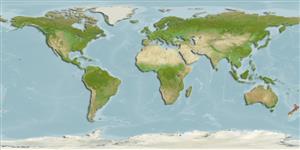Common names from other countries
>
Blenniiformes (Blennies) >
Tripterygiidae (Triplefin blennies) > Tripterygiinae
Etymology: Bellapiscis: Latin, bellum = war + Latin, piscis = fish.
Environment: milieu / climate zone / depth range / distribution range
Ecologia
marinhas demersal; não migratória; intervalo de profundidade 0 - 5 m (Ref. 13227). Temperate
Distribuição
Países | Áreas da FAO | Ecossistemas | Ocorrências | Point map | Introduções | Faunafri
Southwest Pacific: New Zealand.
Comprimento de primeira maturação / Tamanho / Peso / Idade
Maturity: Lm 4.3, range 4 - 4.5 cm
Max length : 6.0 cm SL macho/indeterminado; (Ref. 13227); idade máx. registrada: 3.00 anos (Ref. 13227)
Descrição suscinta
Morfologia | Morfometria
Espinhos dorsais (total): 18 - 21; Raios dorsais (total): 10-15; Espinhos anais 2; Raios anais : 17 - 22. With 17-22 soft anal fin rays, 17-25 lateral line scales, 35-42 +1 total lateral scale rows, and the body with an irregular or without a checker-board pattern, extending to level of belly.
Facultative air-breathing in the genus (Ref. 126274); Adults are found predominantly in tide pools and upper subtidal areas. Are solitary. They feed mainly on amphipods, isopods, polychaetes, and small gastropods. Males may defend small breeding territories during the breeding season (Ref 13227). Eggs are hemispherical and covered with numerous sticky threads that anchor them in the algae on the nesting sites (Ref. 240). Larvae are planktonic which occur primarily in shallow, nearshore waters (Ref. 94114).
Eggs are laid in empty barnacle shells found in rocky areas. The nest is guarded by the male while the eggs are covered with water. Juveniles are found in the intertidal region between August and December (Ref. 13227).
Fricke, R., 1994. Tripterygiid fishes of Australia, New Zealand and the southwest Pacific Ocean (Teleostei). Theses Zool. 24:1-585. (Ref. 13227)
Status na Lista Vermelha da UICN (Ref. 130435)
CITES (Ref. 128078)
Not Evaluated
Ameaça para os humanos
Harmless
Uso pelos humanos
Pescarias: sem interesse
Mais informação
ReferênciasAquaculturaPerfil para aquaculturaEstirpesGenéticaElectrophoresesHereditariedadeDoençasProcessamentoConversão de massa
ColaboradoresFotosStamps, Coins Misc.SonsCiguateraVelocidadeTipo de nataçãoÁrea branquialOtólitosCérebrosVisão
Ferramentas
Relatórios especiais
Baixar XML
Fontes da internet
Estimates based on models
Preferred temperature (Ref.
115969): 13 - 19.8, mean 16.4 (based on 118 cells).
Índice de diversidade filogenética (Ref.
82804): PD
50 = 0.7500 [Uniqueness, from 0.5 = low to 2.0 = high].
Bayesian length-weight: a=0.00708 (0.00366 - 0.01368), b=3.07 (2.89 - 3.25), in cm Total Length, based on LWR estimates for this species & (Sub)family-body (Ref.
93245).
Nível Trófico (Ref.
69278): 3.3 ±0.48 se; based on food items.
Resiliência (Ref.
120179): Elevada, tempo mínimo de duplicação da população menor que 15 meses (tm=1; tmax=3).
Fishing Vulnerability (Ref.
59153): Low vulnerability (10 of 100).
